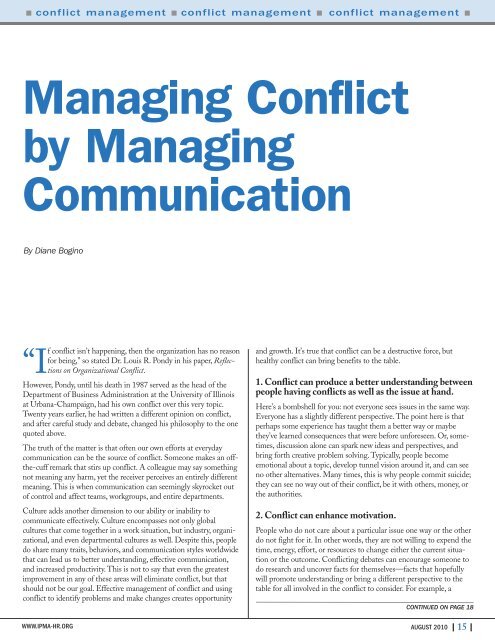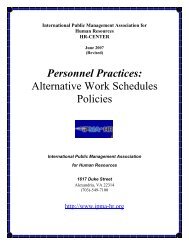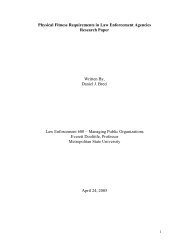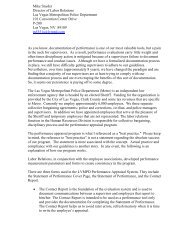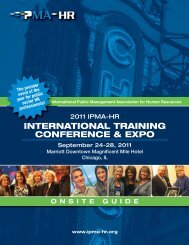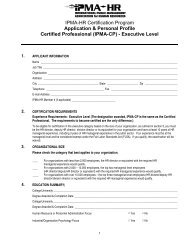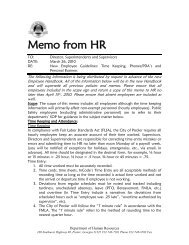Conflict Management Coaching - IPMA
Conflict Management Coaching - IPMA
Conflict Management Coaching - IPMA
You also want an ePaper? Increase the reach of your titles
YUMPU automatically turns print PDFs into web optimized ePapers that Google loves.
■ conflict management ■ conflict management ■ conflict management ■<br />
Managing <strong>Conflict</strong><br />
by Managing<br />
Communication<br />
By Diane Bogino<br />
conflict isn’t happening, then the organization has no reason<br />
for being,” so stated Dr. Louis R. Pondy in his paper, Reflec-<br />
“If<br />
tions on Organizational <strong>Conflict</strong>.<br />
However, Pondy, until his death in 1987 served as the head of the<br />
Department of Business Administration at the University of Illinois<br />
at Urbana-Champaign, had his own conflict over this very topic.<br />
Twenty years earlier, he had written a different opinion on conflict,<br />
and after careful study and debate, changed his philosophy to the one<br />
quoted above.<br />
The truth of the matter is that often our own efforts at everyday<br />
communication can be the source of conflict. Someone makes an offthe-cuff<br />
remark that stirs up conflict. A colleague may say something<br />
not meaning any harm, yet the receiver perceives an entirely different<br />
meaning. This is when communication can seemingly skyrocket out<br />
of control and affect teams, workgroups, and entire departments.<br />
Culture adds another dimension to our ability or inability to<br />
communicate effectively. Culture encompasses not only global<br />
cultures that come together in a work situation, but industry, organizational,<br />
and even departmental cultures as well. Despite this, people<br />
do share many traits, behaviors, and communication styles worldwide<br />
that can lead us to better understanding, effective communication,<br />
and increased productivity. This is not to say that even the greatest<br />
improvement in any of these areas will eliminate conflict, but that<br />
should not be our goal. Effective management of conflict and using<br />
conflict to identify problems and make changes creates opportunity<br />
and growth. It’s true that conflict can be a destructive force, but<br />
healthy conflict can bring benefits to the table.<br />
1. <strong>Conflict</strong> can produce a better understanding between<br />
people having conflicts as well as the issue at hand.<br />
Here’s a bombshell for you: not everyone sees issues in the same way.<br />
Everyone has a slightly different perspective. The point here is that<br />
perhaps some experience has taught them a better way or maybe<br />
they’ve learned consequences that were before unforeseen. Or, sometimes,<br />
discussion alone can spark new ideas and perspectives, and<br />
bring forth creative problem solving. Typically, people become<br />
emotional about a topic, develop tunnel vision around it, and can see<br />
no other alternatives. Many times, this is why people commit suicide;<br />
they can see no way out of their conflict, be it with others, money, or<br />
the authorities.<br />
2. <strong>Conflict</strong> can enhance motivation.<br />
People who do not care about a particular issue one way or the other<br />
do not fight for it. In other words, they are not willing to expend the<br />
time, energy, effort, or resources to change either the current situation<br />
or the outcome. <strong>Conflict</strong>ing debates can encourage someone to<br />
do research and uncover facts for themselves—facts that hopefully<br />
will promote understanding or bring a different perspective to the<br />
table for all involved in the conflict to consider. For example, a<br />
CONTINUED ON PAGE 18<br />
WWW.<strong>IPMA</strong>-HR.ORG AUGUST 2010 | 15 |


